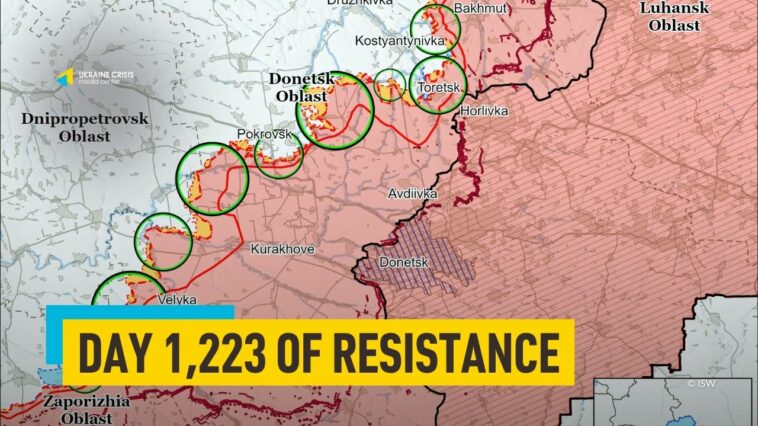Ukraine’s military denies reports of a Russian breakthrough into the region of Dnipro. Russia attacks Kharkiv with a new Chernika drone for the first time. The EU renews sectoral sanctions on Russia for another six months.
Ukraine’s military denies reports of Russian breakthrough into region of Dnipro
As of Monday, Russian forces have not broken through into the region of Dnipro, Head of the Center for Countering Disinformation at Ukraine’s National Security and Defense Council, Lieutenant Andriy Kovalenko, said in a post to Telegram.
The battles rage near the administrative border between the regions of Donetsk and Dnipro. Russian FPV drones are flying into the region of Dnipro, he said, adding: “[Russian troops] have not penetrated [into the region], the fighting is difficult.”
Spokesperson for the Khortytsia operational-strategic group of forces, Major Viktor Trehubov, has also disproved reports of a Russian breakthrough into the region.
“Very intense fighting is raging in the villages that sit near the administrative border between the regions, but [Ukrainian troops] are holding defensive positions there,” Trehubov told Ukraine’s public broadcaster Suspilne on Monday.
Similarly, the 3rd Spartan Brigade of the National Guard deployed to the Pokrovsk direction and the 33rd Separate Mechanized Brigade that holds positions near the village of Bahatyr in Donetsk region have denied the reports of a Russian breakthrough.
On Monday, June 30, DeepState, a Ukrainian OSINT project, updated its online battlefield map to show parts of the region of Dnipro marked as “gray zone”. In some places the gray area stretches more than 800 meters deep into the region.
On June 21, DeepState said Russian forces had advanced in three areas in Donetsk region — near the village of Yablunivka in the Toretsk direction as well as near the villages of Shevchenko and Novoukrayinka in the Novopavlivka direction. Novoukrayinka sits close to the administrative border between the regions of Dnipro and Donetsk.
Russia attacks Kharkiv with new Chernika drone for first time
Russia has for the first time used a new Chernika drone to strike Kharkiv, city mayor, Ihor Terekhov said on Monday.
“The Russian aggressor does not stop trying to inflict damage on Kharkiv. In the past week, there were 16 attacks on our city. The enemy mostly used Shahed drones, but the emergency department also recorded a first-ever attack with a drone of a new type called Chernika (Blueberry),” Terekhov said in a post to Telegram.
The new drone has a warhead as powerful as the Molniya drone, but is built differently. The strike has damaged several cars in a garage area, Terekhov said.
In the past week, Russia’s attacks on Kharkiv injured four people, including a child, he added.
The city’s Nemyshlyanskyi, Kyivskyi and Industrialnyi districts came under attack. Apartment buildings and civilian industrial sites sustained damage.
Chernika-2, one of the drone versions, is increasingly resistant to jamming. The drone has a homing guidance system, but can be also guided manually to increase precision of a strike, news site Ukrainska Pravda said.
EU renews sectoral sanctions on Russia for another six months
The EU has renewed sanctions against Russia for another six months.
“We will continue to pile pressure on Moscow to end its war in Ukraine. Each sanction weakens Russia’s ability to wage war,” the EU foreign policy chief, Kaja Kallas said in a post to X on Monday.
An unnamed source told Ukrainian news site European Pravda that all 27 member states had signed off on the extension of sanctions. The measures will stay in force until January 31, 2026.
The sanctions include “restrictions on trade, finance, energy, technology and dual-use goods, industry, transport and luxury goods. They also cover: a ban on the import or transfer of seaborne crude oil and certain petroleum products from Russia to the EU, a de-SWIFTing of several Russian banks and the suspension of the broadcasting activities and licenses in the European Union of several Kremlin-backed disinformation outlets,” the Council said.
EU leaders have failed to agree on the latest, 18th, package of sanctions at last week’s European Council meeting, with Hungary and Slovakia holding firm in their opposition to the proposed measures.




